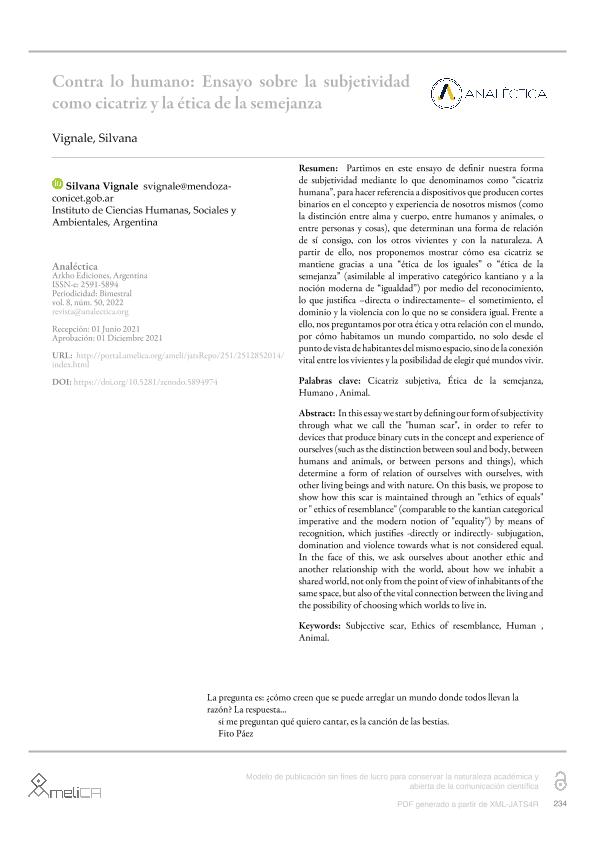Mostrar el registro sencillo del ítem
dc.contributor.author
Vignale, Silvana Paola

dc.date.available
2023-07-12T16:56:27Z
dc.date.issued
2022-01
dc.identifier.citation
Vignale, Silvana Paola; Contra lo humano: ensayo sobre la subjetividad como cicatriz y la ética de la semejanza; Analéctica; Analéctica; 8; 50; 1-2022; 234-248
dc.identifier.uri
http://hdl.handle.net/11336/203525
dc.description.abstract
Partimos en este ensayo de definir nuestra forma de subjetividad mediante lo que denominamos como “cicatriz humana”, para hacer referencia a dispositivos que producen cortes binarios en el concepto y experiencia de nosotros mismos (como la distinción entre alma y cuerpo, entre humanos y animales, o entre personas y cosas), que determinan una forma de relación de sí consigo, con los otros vivientes y con la naturaleza. A partir de ello, nos proponemos mostrar cómo esa cicatriz se mantiene gracias a una “ética de los iguales” o “ética de la semejanza” (asimilable al imperativo categórico kantiano y a la noción moderna de “igualdad”) por medio del reconocimiento, lo que justifica –directa o indirectamente– el sometimiento, el dominio y la violencia con lo que no se considera igual. Frente a ello, nos preguntamos por otra ética y otra relación con el mundo, por cómo habitamos un mundo compartido, no solo desde el punto de vista de habitantes del mismo espacio, sino de la conexión vital entre los vivientes y la posibilidad de elegir qué mundos vivir.
dc.description.abstract
In this essay we start by defining our form of subjectivity through what we call the "human scar", in order to refer to devices that produce binary cuts in the concept and experience of ourselves (such as the distinction between soul and body, between humans and animals, or between persons and things), which determine a form of relation of ourselves with ourselves, with other living beings and with nature. On this basis, we propose to show how this scar is maintained through an "ethics of equals" or " ethics of resemblance" (comparable to the kantian categorical imperative and the modern notion of "equality") by means of recognition, which justifies -directly or indirectly- subjugation, domination and violence towards what is not considered equal. In the face of this, we ask ourselves about another ethic and another relationship with the world, about how we inhabit a shared world, not only from the point of view of inhabitants of the same space, but also of the vital connection between the living and the possibility of choosing which worlds to live in.
dc.format
application/pdf
dc.language.iso
spa
dc.publisher
Analéctica
dc.rights
info:eu-repo/semantics/openAccess
dc.rights.uri
https://creativecommons.org/licenses/by/2.5/ar/
dc.subject
CICATRIZ SUBJETIVA
dc.subject
ÉTICA DE LA SEMEJANZA
dc.subject
HUMANO
dc.subject
ANIMAL
dc.subject.classification
Otras Filosofía, Étnica y Religión

dc.subject.classification
Filosofía, Ética y Religión

dc.subject.classification
HUMANIDADES

dc.title
Contra lo humano: ensayo sobre la subjetividad como cicatriz y la ética de la semejanza
dc.type
info:eu-repo/semantics/article
dc.type
info:ar-repo/semantics/artículo
dc.type
info:eu-repo/semantics/publishedVersion
dc.date.updated
2023-07-06T12:39:11Z
dc.identifier.eissn
2591-5894
dc.journal.volume
8
dc.journal.number
50
dc.journal.pagination
234-248
dc.journal.pais
México

dc.journal.ciudad
Ciudad de México
dc.description.fil
Fil: Vignale, Silvana Paola. Consejo Nacional de Investigaciones Científicas y Técnicas. Centro Científico Tecnológico Conicet - Mendoza. Instituto de Ciencias Humanas, Sociales y Ambientales; Argentina
dc.journal.title
Analéctica
dc.relation.alternativeid
info:eu-repo/semantics/altIdentifier/url/http://portal.amelica.org/ameli/journal/251/2512852014/html/
dc.relation.alternativeid
info:eu-repo/semantics/altIdentifier/doi/https://doi.org/10.5281/zenodo.5894974
Archivos asociados
